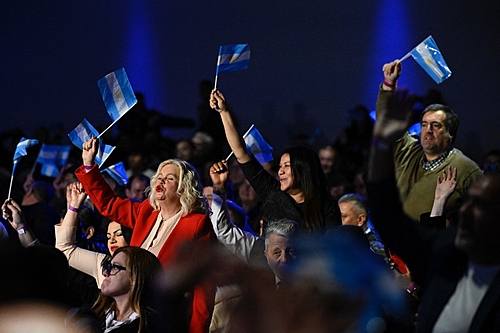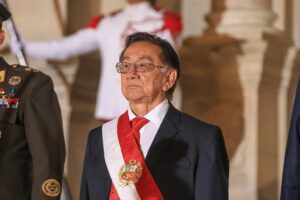
With less than a month to go until the Argentine presidential elections, the candidates from the three main political groups continue to enjoy the preference of around a third of the electorate, and therefore have a mathematical chance of winning.
Sergio Massa (União pela Pátria, left-wing) and Javier Milei (A Liberdade Avança, extreme right) were those who grew the most since the primary elections, according to research institutes. But Patricia Bullrich (Together for Change, right-wing) has some assets to try to recover lost ground in the final stretch. The trend that has emerged so far is that there will be a second round, possibly with the presence of Milei.
:: ‘There is a crisis in Peronism’, says political leader who contested elections in Argentina ::
Mercy, um outsider ultraliberal who adopts a speech against politics, institutions and talks about dollarizing the economy, among other unconventional proposals, leads voting intentions in all recent polls, but this does not appear prominently in the Argentine press.
Anyone who reads the progressive newspaper Página 12 has the feeling that he and Massa are favorites to contest the second round, practically on equal terms. The more conservative dailies, such as Clarín and La Nación, offer more encouragement to think that Bullrich has a good chance of taking Massa out of contention in the first round, which will be held on October 22nd.
In the eight surveys listed by Página 12, Milei appears in first place, with an advantage over Massa that varies from 0.8% to 8%, and Bullrich in third. Some data draw attention: they all have more disapproval than approval; Inflation is identified as the country’s main problem.
::Far right won primaries in Argentina because they know how to communicate, say analysts::
The current government, led by Alberto Fernández, has a 73% negative image – Massa is its Economy Minister and recently launched impact measures to improve the population’s income.
This Sunday (24), there was an election for governor in Mendoza and the victor was Alfredo Cornejo, from the political current known as radicalism, the same as Patricia Bullrich — the third regional victory followed by the radicals, after Santa Fé and Chaco. Radicalism estimates that a total of ten governors could be aligned with Bullrich’s campaign, which could represent significant support.
“As governor-elect, I want to ask you to vote for Patricia in the national election,” said Cornejo. The presidential candidate, who was on the stage, took the opportunity to reinforce her campaign strategy of trying to take votes from Milei. “We are the only force capable of defeating Kirchnerism”, she said, referring to Sergio Massa. She also said that Argentines need to recover “the value of their money”, that exports increase and taxes are reduced.
Even though Massa is referred to as the candidate of Kirchnerism, Cristina Kirchner herself has not committed her political capital to him. According to an article by Walter Schmidt in Clarín, during a campaign event on Saturday alongside Massa, she referred to the economic crisis in the third person — even though she is vice-president of the Republic.
The bet is that Cristina would already count on a likely victory for Milei, after which she would have a triangle of power formed by the government of the province of Buenos Aires (of her ally Axel Kicillof) and by a strong presence in the National Congress and the Legislature of Buenos Aires. Aires, which would allow it to be well positioned on the political scene if Milei’s government is imploded by a deepening of the crisis. The columnist notes that, in a similar way, former president Mauricio Macri has also not done as much effort as he could to ensure that Bullrich wins the election.
Democracy in check
In the context of this electoral dispute marked by the hitherto successful performance of a candidate detached from so-called traditional politics, who tends to speak out publicly in an aggressive manner, the Public Opinion Center of the University of Belgrano released a study that shows that 62% of the population Argentina considers a profound renewal of the political class necessary. And 56% prefer a leadership that imposes its ideas with an iron fist, instead of sticking to the controls of democratic institutions.
Editing: Patrícia de Matos
Source: www.brasildefato.com.br

